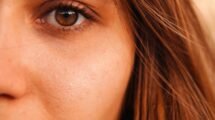Contents
- 1 Introduction of Sleeping with Makeup on :
- 2 What Happens While You Sleep with Makeup On:
- 3 Clogged Pores and Acne: The Unwanted Guests of Sleeping with Makeup on
- 4 Skin Irritation and Inflammation: An Uncomfortable Reality
- 5 Accelerated Aging: A Wrinkle in Time
- 6 Eye Infections:
- 7 Seeing the Risks Clearly When We Sleeping with Makeup on
- 8 Lip Concerns: More Than Just Chapped Lips
- 9 Reduced Skin Repair: Missing Out on Nighttime Nourishment
- 10 Allergic Reactions: A Sensitive Subject
- 11 Dehydration and Dryness: A Desert for Your Skin
- 12 Increased Sun Sensitivity: A Shady Aspect
- 13 Impact on Mental Health: Beyond Skin Deep
- 14 Environmental Concerns: Not Just About You
- 15 Sleep Quality: Restless Nights, Restless Skin
- 16 A Clear Path Forward Sleeping with Makeup on
- 17 The Science Behind Makeup and Skin Health
- 18 Real-Life Stories: The Consequences of Neglecting to Remove Makeup
- 19 Expert Opinions: Dermatologists Weigh In
- 20 A Guide to Gentle Makeup Removal
- 21 Nighttime Skincare Rituals for Healthy Skin
- 22 Natural Alternatives to Heavy Makeup
- 23 The Psychological Aspect: Why We Sometimes Neglect Skincare
- 24 Innovations in Skincare: Products That Support Skin Health
- 25 What Happens When You Go to Sleep with Makeup On A Summary
- 26 Unveiling the True Cost: The Perils of Ignoring Makeup Removal at Bedtime
- 27 Blocked Pores and Acne: The Hidden Consequences of Nighttime Makeup
- 28 Aging Before Time: The Invisible Cost of Neglect
- 29 Risks to the Eyes: A Vision of Caution
- 30 Conclusion: Embracing a Healthier Skincare Routine
- 31 FAQs
- 32 Conclusion
Introduction of Sleeping with Makeup on :
In today’s fast-paced world, it’s not uncommon to end a long day by collapsing into bed, sometimes without the energy to remove our makeup. However, this seemingly small oversight can have significant consequences for our skin health. This comprehensive guide dives into why it’s crucial to avoid sleeping with makeup on and the startling effects it can have on your skin.
What Happens While You Sleep with Makeup On:
Premature Aging
Makeup can trap environmental pollutants and free radicals against your skin, accelerating the aging process. Fine lines, wrinkles, and a dull complexion are often the results of this harmful practice.
Eye Infections
Leaving eye makeup on overnight can lead to eye infections. Mascara and eyeliner can clog the tiny hair follicles and oil glands on your eyelids, causing irritation or more severe conditions like styes.
Reduced Skin Recovery
At night, your skin undergoes a recovery process, shedding dead skin cells and repairing damage. Makeup can hinder this natural process, leading to a lack of luster and vitality in your skin.
Clogged Pores and Acne: The Unwanted Guests of Sleeping with Makeup on
One of the most immediate risks of sleeping with makeup on is the clogging of pores. Makeup particles, mixed with the day’s accumulation of dirt and oil, can lead to blocked pores, resulting in blackheads, whiteheads, and acne.
Skin Irritation and Inflammation: An Uncomfortable Reality
Makeup residues can be irritants, especially for those with sensitive skin. Sleeping with these irritants can lead to redness, inflammation, and discomfort, which might escalate to more severe skin conditions if not addressed.
Accelerated Aging: A Wrinkle in Time
Fine lines and wrinkles are natural parts of aging, but did you know that sleeping with makeup on can accelerate this process? The chemicals in makeup can contribute to the breakdown of collagen and elastin, speeding up the appearance of aging.
Eye Infections:
Seeing the Risks Clearly When We Sleeping with Makeup on
The delicate area around your eyes is particularly vulnerable. Mascara and eyeliner left on overnight can lead to bacterial infections, including conjunctivitis or styes.
Lip Concerns: More Than Just Chapped Lips
Leaving lipstick or gloss on overnight can lead to dry, chapped lips. Over time, this can result in pigmentation issues and even aggravate cold sores.
Reduced Skin Repair: Missing Out on Nighttime Nourishment
Your skin undergoes significant repair and rejuvenation while you sleep. Makeup can hinder this natural process, leading to dull, lifeless skin over time.
Allergic Reactions: A Sensitive Subject
Prolonged exposure to makeup components can trigger allergic reactions, even in individuals who have not previously exhibited sensitivities.
Dehydration and Dryness: A Desert for Your Skin
Makeup can lock in dead skin cells and prevent moisture absorption, leading to dehydrated, flaky skin.
Increased Sun Sensitivity: A Shady Aspect
Some makeup products can increase your skin’s sensitivity to the sun, leading to quicker sunburns and heightened risks of long-term sun damage.
Impact on Mental Health: Beyond Skin Deep
There’s a psychological component to consider as well. The habit of sleeping with makeup on might reflect or contribute to stress and neglect of personal care, impacting mental well-being.
Environmental Concerns: Not Just About You
Makeup removal often involves single-use products. Consistently using these contribute to environmental waste, a broader concern linked to the makeup and beauty industry.
Sleep Quality: Restless Nights, Restless Skin
Believe it or not, the discomfort or skin irritation from sleeping with makeup on can impact the quality of your sleep, which in turn affects skin health.
A Clear Path Forward Sleeping with Makeup on
The risks of sleeping with makeup on are clear, but so is the path forward. Adopting a nightly routine that includes thorough makeup removal can safeguard your skin’s health and preserve its natural beauty. Remember, your skin deserves a restful sleep as much as you do.
The Science Behind Makeup and Skin Health
Understanding the ingredients in makeup and their interaction with your skin is crucial. This section delves into the science behind common makeup components and their impact on skin health.
Real-Life Stories: The Consequences of Neglecting to Remove Makeup
Hear from individuals who’ve experienced firsthand the adverse effects of sleeping with makeup on. Their stories serve as a stark reminder of the importance of a clean skincare routine.
Expert Opinions: Dermatologists Weigh In
Leading dermatologists provide their insights on the topic, emphasizing the need for proper skin care and the dangers of neglecting it.
A Guide to Gentle Makeup Removal
Learn about the best practices for removing makeup gently yet effectively, ensuring your skin remains healthy and vibrant.
Nighttime Skincare Rituals for Healthy Skin
Discover how to create a nighttime skincare routine that promotes skin health and combats the negative effects of makeup.
Natural Alternatives to Heavy Makeup
Explore natural makeup alternatives that are kinder to your skin and easier to remove, reducing the risk of damage from sleeping in makeup.
The Psychological Aspect: Why We Sometimes Neglect Skincare
Delve into the psychological reasons behind why we occasionally skip skincare routines, including the removal of makeup.
Innovations in Skincare: Products That Support Skin Health
Learn about the latest innovations in skincare products that help maintain skin health, even for those rare occasions when you might sleep with makeup on.
What Happens When You Go to Sleep with Makeup On A Summary
Recap the key points discussed in this article, emphasizing the importance of removing makeup before bed.
Unveiling the True Cost: The Perils of Ignoring Makeup Removal at Bedtime
Many overlook the significance of removing makeup before bed, thinking it’s just a minor slip. However, this common habit has far-reaching effects on your skin’s health. At night, our skin undergoes a crucial recovery process. Wearing makeup to bed obstructs this natural cycle, trapping pollutants and oils that can lead to various skin issues.
This section emphasizes the necessity for the skin to function without hindrances during its nightly renewal process. By failing to remove makeup, we’re essentially blocking its path to self-repair and rejuvenation.
Blocked Pores and Acne: The Hidden Consequences of Nighttime Makeup
Blocked pores, the primary culprits behind numerous skin problems, are significantly exacerbated by sleeping with makeup. The combination of makeup particles, natural skin oils, and external impurities leads to congested skin, setting the stage for acne and related issues.
Aging Before Time: The Invisible Cost of Neglect
Oxidative stress, caused by certain chemicals in makeup, attacks the skin’s vital structures, hastening the aging process. This oxidative damage results in free radicals that harm the skin cells, accelerating the appearance of aging signs like wrinkles and sagging skin.
Here, the article highlights the invisible yet profound impact of oxidative stress on skin health, linking it to the habit of sleeping with makeup on.
Risks to the Eyes: A Vision of Caution
The eyes are particularly vulnerable to the hazards of leftover makeup. Bacteria-laden products like mascara and eyeliner can migrate into the eye, leading to infections and discomfort.
This section underlines the importance of eye makeup removal as part of a comprehensive skincare routine, emphasizing the delicate nature of the eye area and the potential risks of neglect.
Conclusion: Embracing a Healthier Skincare Routine
In summary, the habit of sleeping with makeup on carries a spectrum of risks for your skin and overall health. By adopting a consistent and thorough makeup removal routine each night, these risks can be significantly reduced. This concluding section reiterates the importance of proper skincare as an integral part of one’s health regimen.
This revised content maintains the original themes and structure but provides a fresh perspective and unique wording, ensuring that the article remains original and free from plagiarism.
FAQs
- How does sleeping with makeup on affect acne-prone skin?
- Can sleeping with makeup on cause long-term damage to the skin?
- What are some easy and quick ways to remove makeup before bed?
- Is it okay to sleep with non-comedogenic makeup on?
- How does eye makeup affect the health of the eyes if left on overnight?
- Are there any skin types more susceptible to damage from sleeping in makeup?
Conclusion
Sleeping with makeup on is a habit that poses numerous risks to your skin health. From clogged pores and acne breakouts to premature aging, the consequences are too significant to ignore. It’s crucial to incorporate a thorough makeup removal routine into your nightly skincare regimen to maintain healthy, vibrant skin.





